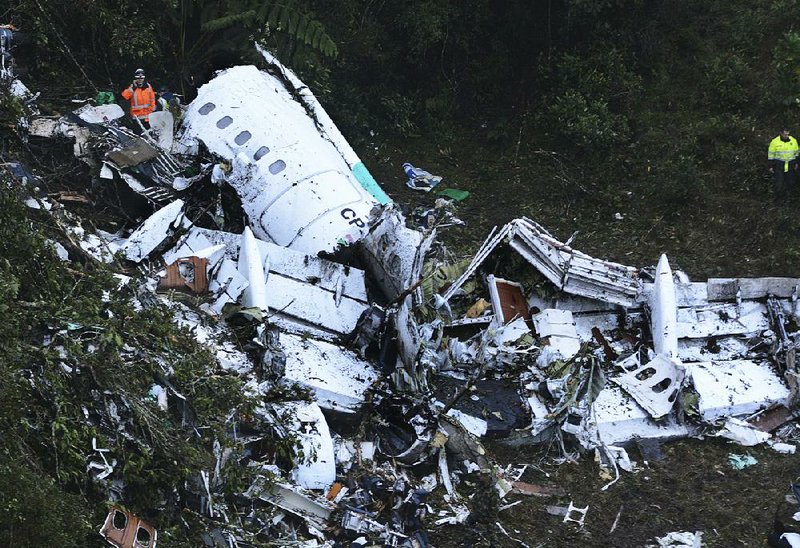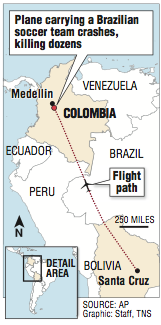LA UNION, Colombia -- A chartered plane carrying a Brazilian soccer team crashed into a Colombian mountain and broke into pieces, killing 71 people and leaving six survivors, officials said Tuesday.
The British Aerospace 146 short-haul plane, operated by a charter airline with roots in Venezuela, declared an emergency and lost radar contact just before 10 p.m. Monday because of an electrical failure, according to Colombia's aviation agency.
The aircraft, which had departed from Santa Cruz, Bolivia, was carrying the Chapecoense soccer team from southern Brazil for Wednesday's first leg of a two-game Copa Sudamericana final against Atletico Nacional of Medellin.
"What was supposed to be a celebration has turned into a tragedy," Medellin Mayor Federico Gutierrez said from the search-and-rescue command center.
Expressions of grief poured in from all over the soccer world. South America's federation canceled all scheduled matches in a show of solidarity, Real Madrid's squad interrupted its training for a minute of silence, and Argentina legend Diego Maradona sent his condolences to the victims' families over Facebook.
Rescuers working through the night were initially heartened after pulling three passengers alive from the wreckage. But as the hours passed, heavy rainfall and low visibility grounded helicopters and slowed efforts to reach the crash site.
At daybreak, dozens of bodies scattered across a muddy mountainside were collected into white bags. They were then loaded onto several Black Hawk helicopters that had to perform a tricky maneuver to land on the crest of the Andes mountains. The plane's fuselage appeared to have broken into two upon hitting the mountaintop, with the nose facing downward into a steep valley.
Among the survivors, Chapecoense defender Alan Ruschel was in the most serious condition and was later transported to another facility to undergo surgery for a spinal fracture. His teammates Helio Zampier and Jakson Follmann also suffered multiple trauma injuries, hospital officials said. A journalist traveling with the team was recovering from surgery, and two Bolivian crew members who survived were in stable condition.
The aircraft is owned by LaMia, a company that started off as a regional operator in Venezuela but later relocated to Bolivia, where it was granted certification to operate last January. The airline has a close relationship with several premier South American squads.
Before being taken off-line, LaMia's website said it operated three 146 Avro short-haul jets made by British Aerospace and with a maximum range of about 1,600 nautical miles -- about the same as the distance between Santa Cruz and Medellin, the route it was flying when it went down.
Colombia's aviation authority said initial reports suggest the aircraft was suffering electrical problems although investigators were also looking into an account from one of the survivors that the plane ran out of fuel about five minutes from its expected landing at Jose Maria Cordova airport outside Medellin.
"We can't rule out anything. The investigation is ongoing and we're going to await the results," said Gustavo Vargas, a retired Bolivian air force general who is president of the airline.
Bolivia's civil aviation agency said the aircraft picked up the Brazilian team in Santa Cruz, where players had arrived earlier in the day on a commercial flight from Sao Paulo. Spokesman Cesar Torrico said the plane underwent an inspection before departing for Colombia and reported no problems.
British Aerospace, which is now known as BAE Systems, says that the first 146-model plane took off in 1981 and that fewer than 400 were built in the U.K. through 2003. About 220 are still in service in a variety of roles, including aerial firefighting and overnight freight services. The airplane that crashed was built in 1999, Vargas said.
The team, from the small agro-industrial city of Chapeco, was in the midst of a Cinderella season. It joined Brazil's first division in 2014 for the first time since the 1970s and advanced last week to the Copa Sudamericana finals -- the equivalent of the UEFA Europa League tournament -- after defeating Argentina's San Lorenzo and Independiente, as well as Colombia's Junior.
"This morning I said goodbye to them and they told me they were going after the dream, turning that dream into reality," Chapecoense board member Plinio De Nes told Brazil's TV Globo. "The dream was over early this morning."
The team won over fans across Brazil with its spectacular run to the finals, with some even taking up a campaign online to move the final match to Rio de Janeiro's iconic Maracana stadium, where the 2014 World Cup finals were played.
The tragedy of so many young and talented players' lives and dreams cut short brought an outpouring of support far beyond Brazil's borders. Atletico Nacional said in a statement it was offering its title to the team, saying in a statement that the accident "leaves an indelible mark on the history of Latin American and world soccer."
Information for this article was contributed by Mauricio Savarese, Stephen Wade, Renata Brito, Carlos Valdez and David Koenig of The Associated Press.
A Section on 11/30/2016

